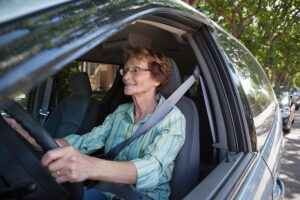Just because an aging senior has chosen assisted living for their future doesn’t mean they can’t drive anymore. Not every assisted living facility will offer the option for elderly residents to keep their vehicle on the premises, but there’s absolutely no reason why a senior can’t still drive.
What should an aging senior ask when looking into assisted living?

Assisted Living Fairhope, AL: Seniors and Driving
If keeping their car on the grounds and being able to drive is still of vital importance to them, they should definitely reach out to the administrative staff at an assisted living facility they’re considering and find out what provisions are in place for a resident to maintain a vehicle there.
The facility might charge extra for that parking space. They might also require certain tests or permissions for the individual to keep a vehicle there and drive. Having residents of that age, who may require some physical or mental assistance during the day, might increase potential insurance rates for the assisted living community, which may complicate matters even further.
Also find out what kind of transportation options the facility offers.
Not all assisted living communities are going to provide transportation services to their residents, but for those that do, find out what those services provide, where they might drive to, if it costs extra, if it is included in the monthly cost of living, and so forth.
Getting around, going to stores, getting to a doctor’s appointment, and more remain incredibly important for aging seniors. Just because an elderly person might need an extra level of support and security as they age doesn’t mean they have to give up living.
And that is precisely what assisted living is designed to do: help aging men and women maintain a higher quality of life then they might have simply staying at home, being alone.
When should an aging senior consider surrendering their license?
Each state may have different requirements and even test elderly men and women annually or biannually for vision, hearing, and even a full driver’s test to make sure they remain safe on the road, but if the elderly person is still licensed, cogent, sharp behind the wheel, then there may be no reason to have to give up their license to drive.
If they don’t have a vehicle, though, it becomes essentially a moot point. Without a vehicle, the elderly resident won’t need to drive anywhere. But, driving is often considered a very important part of life, so avoid being dismissive about this very important topic when an aging senior in your life is looking at assisted living.


Follow Us!